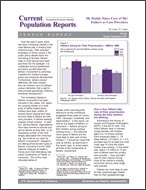My Daddy Takes Care of Me! Fathers as Care Providers
My Daddy Takes Care of Me! Fathers as Care Providers
Over the past 5 years, there has been increasing interest in the roles fathers play in shaping their children’s lives. With renewed emphasis on family values in the public policy debate about the well-being of families, fathers’ roles in child-rearing have been launched into the spotlight. It is undisputed among researchers and policy pundits alike that fathers’ involvement is extremely important for children’s proper social and emotional development. Furthermore, fathers interact differently with their children than do mothers, and it is fathers’ unique interaction that is said to help promote specifically children’s emotional development.1
The increasing interest in fathers’ involvement has been mirrored in the media, with reporters covering stories on a wide array of father-related topics. Articles have been written on diverse topics ranging from stay-at-home dads to fathers as child care providers, to fathers seeking custody of their children. In addition, several fathers’ organizations have been formed to provide support to fathers as they take on an increasing number of the challenges associated with child-rearing. But what do we mean by fathers’ involvement? Researchers distinguished several types of fathers’ involvement at the 1996 National Institutes of Health’s Family and Child Well-Being Network’s Conference on Father Involvement. One of the most influential series of studies which was frequently referred to at this conference suggested three types of involvement: interaction, availability, and responsibility.2 In this report, we look at one aspect of fathers’ involvement — fathers caring for their children during mothers’ working hours — and examine which types of fathers are the most likely to take care of their children.3 It should be noted that care by fathers, as examined in this report, taps, to some extent, all three of the components of fathers’ involvement.
_______________
1 Parke, R.D. 1990. “In Search of Fathers: A Narrative of an Empirical Journey.” In Methods of Family Research, Volume 1. I. Sigel and G. Brody, eds. Hillsdale, NJ: Erlbaum.
2 Lamb, M.E., J.H. Pleck, E.L. Charnov, and J.A. Levine. 1987. “A Biosocial Perspective on Paternal Behavior and Involvement. In Parenting Across the Lifespan: Biosocial Dimensions. J.B. Lancaster, J. Altman, A.S. Rossi, and L.R. Sherrod, eds. New York: Aldine de Gruyter.
3 In this report, we use the term “working” to refer to mothers who are working for pay, whether at home or away from home; we do not mean to infer that homemaking activities do not constitute work.
Others in Series
Publication
Publication
Publication




